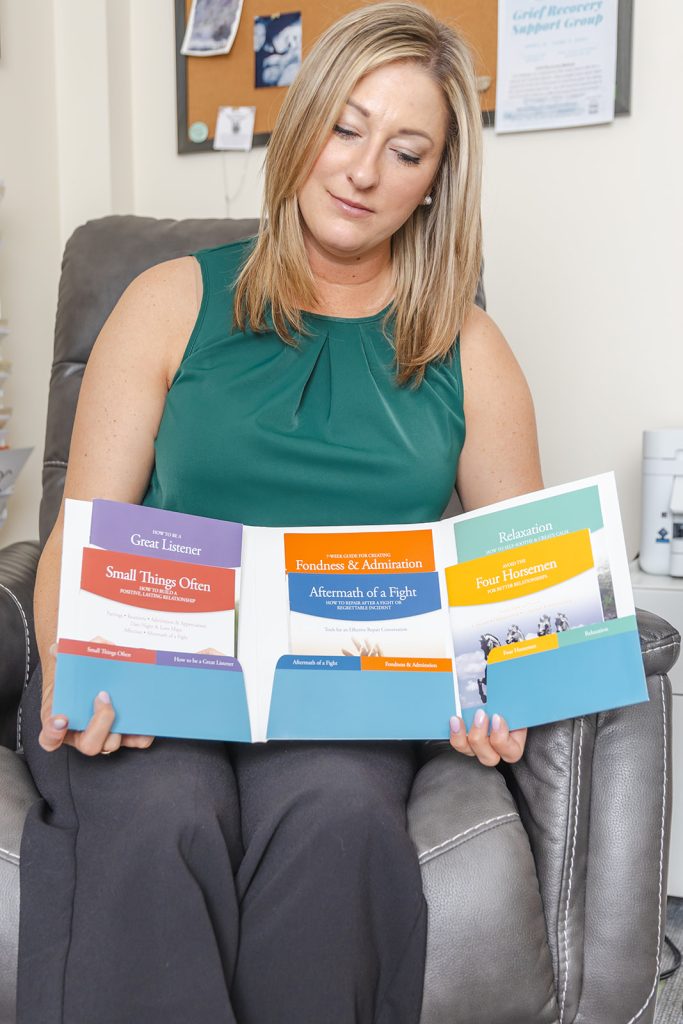Couples Therapy
Are Communication Issues Negatively Impacting Your Relationship?

Are you currently experiencing challenges in your relationship? Have issues such as infidelity, past traumas, or addictions been affecting the relationship? Perhaps you or your partner struggle with regulating emotions, which leads to negative behaviors like anger, yelling, criticism, and defensiveness. It’s also possible that you or your partner tend to stonewall and refuse to communicate during tough times.
Perhaps you feel like you are unable to talk to anyone about your relationship problems and everything continues to get bottled up. You may feel like your friends and family suspect something is wrong but don’t know how to address it. If this is you and your relationship, you may want to consider seeking help. Even in healthy relationships, issues can arise, and couples therapy can be beneficial.
Some Couples Stop Engaging With Each Other, And It’s Hurting The Relationship
The two of you might no longer be intimate with each other, engage in only surface-level conversations, neglect date nights, or shift your focus entirely to the kids. You may find yourself walking on eggshells, feeling heated and on the verge of exploding, or isolated and reclusive to the bedroom or basement. Instead of prioritizing your relationship, you distract yourselves with drinking, TV, social media, sleeping, exercise, working or shopping, etc. These distractions from the underlying, unresolved problem can lead to disagreements over chores and constant blow-ups over even the most minor issues. This can lead to sleeping in separate rooms, eye-rolling, name-calling, and even infidelity or looking outside of the relationship to fill the void.
If this sounds like your everyday life, we encourage you to pursue counselling with me and give your relationship or marriage a fresh start. Couples therapy could be the answer to living a more peaceful life together and repair what has been broken.
Modern-Day Pressures Make Anxiety Very Prevalent
 Trying to maintain perfectionism in real life and online can often make you believe you are not doing enough and need to do more.
Trying to maintain perfectionism in real life and online can often make you believe you are not doing enough and need to do more.
Additionally, over time, you may become over exhausted, depressed and stop caring for yourself (self-care, hygiene, social life, professional life, etc.). Ultimately, your physical health also takes a toll. Those around you start noticing that you are different, asking if everything is okay.
Putting on a front or masking what is actually going on with you is only hiding your anxiety. When we try and hide our anxiety, we tend to do things like isolate ourselves from our loved ones, spend a lot of money on things we don’t need, sleep and eat less or more than usual, immerse ourselves in social media or TV and fantasy, exercise excessively or stop exercising at all, and so much more. Avoiding the deeper level issues going on in your life may also cause you to become irritable and irrationally angry, lashing out at others, only exasperating the distance from your support system.
You don’t have to change your sense of self or mask your pain to be happy.
As experienced anxiety therapists, we can help you get your life back.
Being “Too Busy” To Work On Your Relationship Is Common Today
Couples often struggle to work through their problems due to various reasons. One of the main issues is lack of communication, as partners may not express their thoughts and feelings openly. This could be because they don’t know how to say something, they don’t feel heard when communicating, or are scared to share openly and honestly. Additionally, the prevalence of being on smartphones and social media all the time can lead to a lack of meaningful interactions. Furthermore, factors such as working too much, financial strain, and the responsibilities of raising children can all contribute to couples being too busy to address their issues effectively.
Couples may not be able to handle specific issues independently, as John and Julie Gottman described using the term “gridlocked.” Gridlock occurs when two people cannot agree on a particular matter and continue arguing about it without any resolution. This impasse is quite common and can be attributed to a lack of communication skills, difficulty in self-regulation, and an inability to control emotions. Without the necessary tools to navigate these challenges, couples cannot move past these gridlocked issues unless they can find a way to reach a compromise.
Couples therapy can help you reach that compromise. You don’t have to be gridlocked forever. There are ways to learn how to communicate and control your emotions when becoming flooded properly.
Couples Therapy Can Teach You About Regaining Trust, Commitment, and Effective Communication
During the initial in-person session, we will dedicate time to speaking with you and your partner together, allowing each of you to share the history and past of your relationship up to the present day. During the second session, we will meet with you both separately to delve deeper into your personal story and experiences. By the third session, a treatment plan will be devised, and interventions will be initiated to address core issues. We will focus on helping you recognize and manage defensiveness, criticisms, contempt, and stonewalling for improved relational dynamics.
The core factors that must be learned in couples therapy are trust, commitment, and communication. Without understanding and putting these concepts into practice, a relationship may not have the ability to thrive. Throughout counselling, we will give you plenty of opportunities to do that through homework and other exercises.
The Gottman Method
The Gottman Method utilized during couples therapy provides you with specific tools and resources to practice at home as homework assignments. You are given worksheets with instructions on addressing points of contention and how to do so effectively. The Gottman Method includes resources for building Love Maps, Sharing Fondness and Admiration, Turning Towards Each Other, and Creating a Life of Shared Meaning. These intervention tools are designed to help couples move from conflict to understanding.
With the help of these Gottman-inspired interventions, you can develop skills to regulate yourself, focus on the topic at hand only, strive to understand your partner, practice active listening, and communicate feelings and thoughts effectively. You can also learn to use clear language, address needs, avoid engaging in the Four Horseman behaviours (a Gottman Method term), and demonstrate respect, empathy, compassion, and a trusting alliance again. While couples counselling is not an automatic fix and is seen as a longer term investment, it provides the support of a couples therapist who can facilitate and moderate healthier discussions and improve communication between you. Even after you think you are doing well, maintenance sessions can be very helpful to check-in with each other and make sure nothing else is being left unaddressed.
You May Be Interested In Couples Therapy, But Have More Questions…
Many people fear undergoing couples therapy, particularly due to the fear of the relationship ending when you both want it to be saved or the fear of the unknown when starting counselling. The Gottman Method offers specific tools, personalized assessments, and evidence-based interventions to address specific issues, promoting lasting change and strengthening emotional connections for more fulfilling and resilient relationships.
It’s completely normal to feel apprehensive about attending counselling sessions as a couple, especially when it comes to gender dynamics and the fear of taking sides. As a professionally trained Level 1 and 2 Gottman Method couples therapist, we can remove bias, understand, and empathize with both perspectives. After the initial joint session, the subsequent sessions are designed for each individual to attend alone. This provides a safe and unbiased space for sharing your thoughts openly and honestly without the presence of your partner and for your therapist to get to know you more personally and how you view the relationship.
Because our approach is comprehensive and looks at the deeper issues driving your anxiety, we believe that you will find it more effective than most approaches to the healing process. What’s more, we offer a free, 10-minute phone consultation so that we can make sure we’re a good fit and have the potential for a great rapport for each other ahead of time.
Your therapist is not a secret keeper. In couples therapy, the informed consent will specify that no secrets will be kept from either party. We will encourage open communication and ask you to share anything being kept from the other person in the next session. This approach helps us maintain neutrality and ensures that everything is out in the open from the outset, allowing for honest and trustworthy progress in therapy.
Are You Ready To Commit To Saving Your Relationship?
If you want to strengthen your relationship, I encourage you to make the decision to start the process. Call us at (780) 719-2807 for a free 10-minute consultation. You can also send an email or access our contact page.


